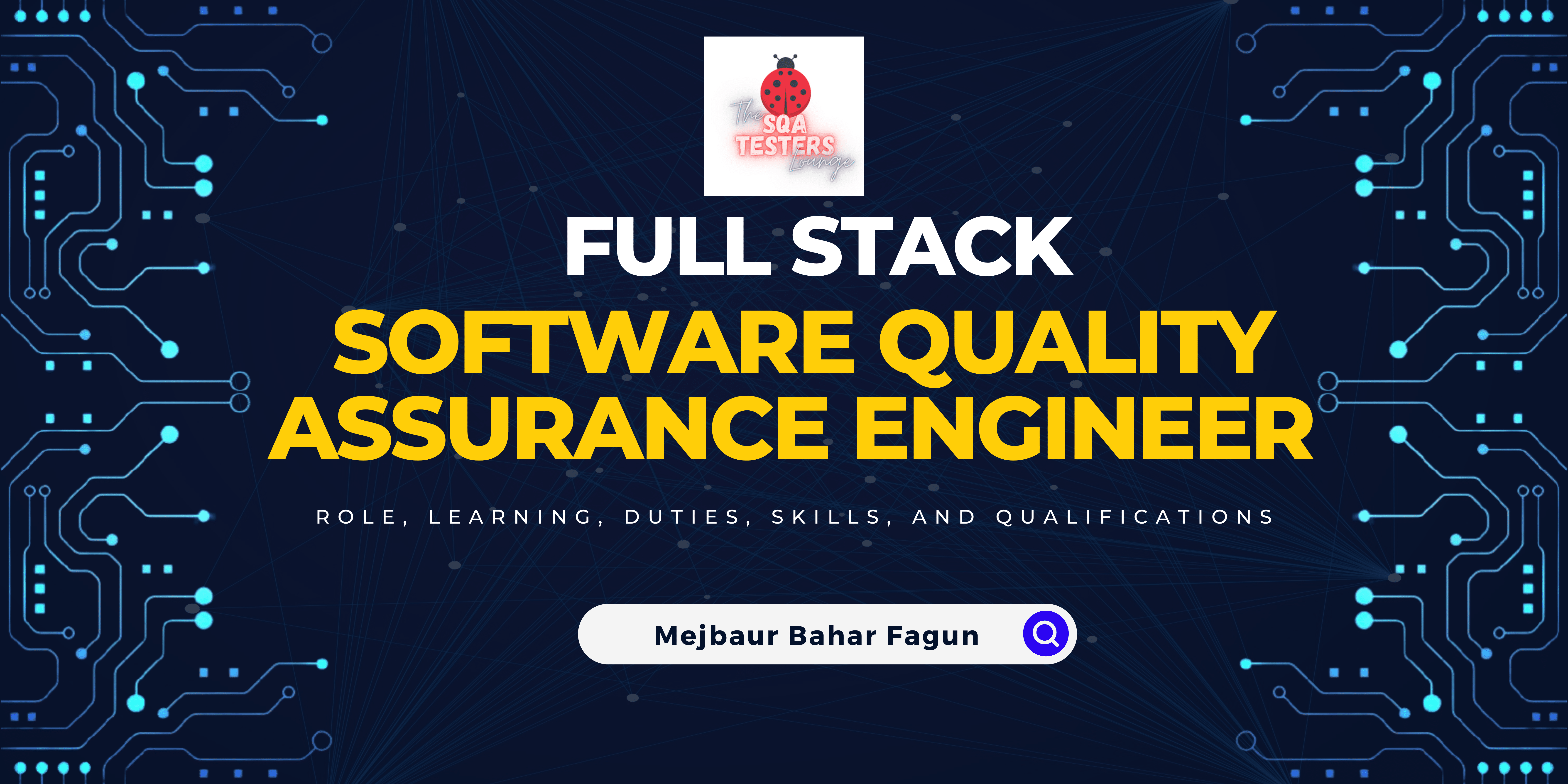Full Stack Software Quality Assurance Engineer - Role, Learning, Duties, Skills, and Qualifications
 Mejbaur Bahar Fagun
Mejbaur Bahar Fagun
As software development has become an essential part of the modern business landscape, the role of a full-stack software quality assurance (SQA) engineer has become increasingly important. A full-stack SQA engineer is responsible for ensuring the quality of software products from the beginning of the development process until the end. In this article, we will discuss what a "full-stack" SQA engineer is, what skills and knowledge they need, the testing tools they use, and more.
What is a Full Stack Software Quality Assurance Engineer?
A Full Stack Software Quality Assurance Engineer is a professional who is responsible for ensuring the quality of software products by creating and implementing testing procedures. The role of an SQA engineer is to ensure that software products are free from errors and function correctly. They are responsible for developing and implementing test plans, analyzing test results, and reporting defects.
This article provides an overview of the Full Stack Software Quality Assurance Engineer role, Learning, including the duties, skills, and qualifications required.
Learning Section
To become a full-stack SQA engineer, you need a combination of technical and soft skills. Here are some of the skills you need to acquire to become an SQA engineer:
Programming: You should be proficient in at least one programming language, such as Java, Python, or C++.
Software Development Life Cycle (SDLC): Understanding the software development life cycle is essential to ensure that you can test software products effectively.
Testing Methodologies: Knowing different testing methodologies such as black box testing, white box testing, and grey box testing is essential to choose the appropriate testing methodology for different scenarios.
Test Automation: Being able to automate tests using frameworks like Selenium or Appium is an essential skill for an SQA Engineer.
Soft Skills: An SQA Engineer needs to have excellent communication skills to be able to communicate effectively with developers, testers, and other stakeholders.
Duties
The full-stack software quality assurance engineer has several duties to perform, including:
Developing and implementing quality assurance processes - This person is responsible for creating and implementing processes that help ensure the software being developed meets quality standards. They may also develop and implement testing plans and procedures.
Creating and executing test cases - The Full Stack Software Quality Assurance Engineer is responsible for creating test cases and ensuring that they are executed properly. They may also work with developers to identify and resolve bugs and other issues.
Conducting manual and automated testing - This person is responsible for testing the software manually and using automated testing tools. They may use test automation frameworks, such as Selenium or Appium, to automate tests.
Collaborating with developers and other stakeholders - The Full Stack Software Quality Assurance Engineer works closely with developers, project managers, and other stakeholders to ensure that the software meets the requirements of the stakeholders.
Identifying and reporting defects - This person is responsible for identifying defects and other issues in the software and reporting them to the appropriate parties. They may also work with developers to resolve these issues.
Documenting test results - The Full Stack Software Quality Assurance Engineer is responsible for documenting test results and communicating them to the appropriate parties.
Skills
The full-stack software quality assurance engineer should possess the following skills:
Knowledge of software development methodologies - This person should be familiar with software development methodologies, including Agile, Waterfall, and DevOps.
Understanding of software testing methodologies - This person should have knowledge of software testing methodologies, including manual and automated testing.
Familiarity with test automation tools and frameworks - The Full Stack Software Quality Assurance Engineer should be familiar with test automation tools and frameworks, such as Selenium or Appium.
Excellent communication skills - This person should have excellent communication skills, as they will be working with developers, project managers, and other stakeholders.
Attention to detail - The Full Stack Software Quality Assurance Engineer should have excellent attention to detail, as they will be responsible for identifying defects and other issues in the software.
Ability to work in a team - This person should have the ability to work in a team and collaborate with developers, project managers, and other stakeholders.
Qualifications
The Full Stack Software Quality Assurance Engineer should possess the following qualifications:
Bachelor's degree in Computer Science or related field - A bachelor's degree in Computer Science or a related field is typically required for this role.
Experience in software quality assurance - The Full Stack Software Quality Assurance Engineer should have experience in software quality assurance, including manual and automated testing.
Familiarity with software development tools - This person should be familiar with software development tools, including IDEs, version control systems, and bug-tracking systems.
Understanding of software design and architecture - The Full Stack Software Quality Assurance Engineer should have an understanding of software design and architecture.
Knowledge of programming languages - This person should have knowledge of programming languages, such as Java, Python, or Ruby.
Testing Tools
As an SQA engineer, you need to be familiar with different testing tools to perform different testing activities. Here are some of the tools that an SQA engineer needs to know:
Bug Tracking Tools- Bug tracking tools like Jira, Bugzilla, and Trello help track and manage defects found during testing.
Test Management Tools- Test management tools like TestRail and Zephyr are used to manage the testing process and ensure that tests are executed correctly.
Continuous Integration and Continuous Delivery (CI/CD) Tools- CI/CD tools like Jenkins and Travis CI are used to automate the build and deployment process, enabling developers to test their code quickly and efficiently.
Test Automation Tools- Test automation tools like Selenium and Appium are used to automate tests and ensure that software products are free from defects.
Performance Testing Tools- Performance testing tools like JMeter and Gatling are used to test the performance of software products and identify bottlenecks.
Conclusion
In conclusion, a full-stack SQA engineer plays a crucial role in ensuring that software products meet the required quality standards. To become an SQA engineer, you need a combination of technical and soft skills, such as programming knowledge, knowledge of SDLC and testing methodologies, and excellent communication skills. Furthermore, you need to be familiar with different testing tools to perform different testing activities. By acquiring the necessary skills and knowledge, you can become a successful full-stack SQA engineer.
📢 Join SQA Testers Facebook Group: The SQA Testers' Lounge | Facebook
🔀 𝐂𝐨𝐧𝐧𝐞𝐜𝐭 𝐖𝐢𝐭𝐡 𝐌𝐞
𝐅𝐚𝐜𝐞𝐛𝐨𝐨𝐤: https://lnkd.in/dQhnGZTy
𝐅𝐚𝐜𝐞𝐛𝐨𝐨𝐤 𝐏𝐚𝐠𝐞: https://lnkd.in/gaSKMG2y
𝐈𝐧𝐬𝐭𝐚𝐠𝐫𝐚𝐦: https://lnkd.in/gid7Ehku
Hashnode: Mejbaur Bahar Fagun
Twitter: Mejbaur Bahar Fagun (@fagun018) / Twitter
𝐌𝐞𝐝𝐢𝐮𝐦: https://lnkd.in/gP6V2iQz
𝐆𝐢𝐭𝐡𝐮𝐛: https://github.com/fagunti
𝐘𝐨𝐮𝐓𝐮𝐛𝐞: https://lnkd.in/gg9AY4BE
#sqa #sqaengineer #qa #qaengineer #qajobs #qaautomation #qatester #qaanalyst #qamanual #qatesting #qaengineers #qaautomationengineer #qalead #qamanualtester #softwaretester #softwareqa #softwarequalityassurance #thesqatesterslounge #thesqatesterlounge #sqatesterlounge #mejbaurbaharfagun #MejbaurBaharFagun #mejbaur #bahar #fagun #MejbaurbaharFagunSQAEngineer
#FullStack #SoftwareQA #Engineer #QualityAssurance #SoftwareTesting #Automation #Agile #DevOps #Programming #Skills #Qualifications #SoftwareDevelopment #Methodologies #TestAutomationTools #Selenium #Appium #CommunicationSkills #Teamwork #AttentionToDetail #SoftwareArchitecture #ProgrammingLanguages #ComputerScience #ManualTesting #AutomatedTesting #BugTrackingSystems #VersionControlSystems #SoftwareDesign #TestingFrameworks #ContinuousIntegration #ContinuousDelivery #SoftwareDeployment #QualityControl #TestingProcess #DefectTracking #TestPlans #TestCases #TestResults #Collaboration #ProblemSolving #CriticalThinking #QualityStandards #SoftwareProducts #SoftwareEngineering #FullStackDevelopment #FullStackEngineering
Subscribe to my newsletter
Read articles from Mejbaur Bahar Fagun directly inside your inbox. Subscribe to the newsletter, and don't miss out.
Written by

Mejbaur Bahar Fagun
Mejbaur Bahar Fagun
With a strong background in both Software QA Engineering and Certified Ethical Hacking, I bring a unique and comprehensive skill set to my work. My expertise in manual and automated testing, along with my ability to design effective test frameworks from scratch, makes me a valuable asset to any software development team. My familiarity with both the Waterfall and Scrum methodologies of the SDLC ensure that I can operate seamlessly within any development process. I have a proven track record of effectively verifying software products, conducting thorough online form factor validations, and verifying complex algorithm designs through the use of Matlab scripts. Let me bring my technical expertise and commitment to ethical practices to your next project.